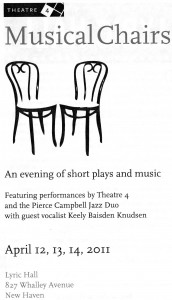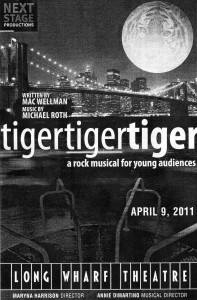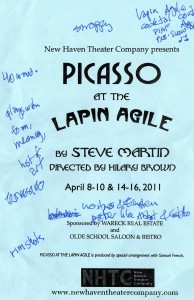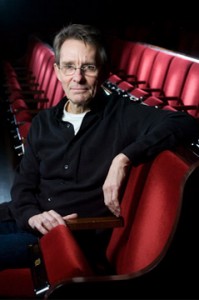
A week before the beginning of his second full season as artistic director of the Westport country playhouse, does Mark Lamos feel back in the swing of things, or did his programming instincts never leave him?
Lamos returned to the art-dir racket in early 2009 after nearly a decade as a freelance director of plays and operas around the country (including a couple of shows at Yale Rep). Before that, of course, he programmed 17 seasons as artistic director of Hartford Stage.
In his freelance years, was it hard to stop thinking in terms of longterm planning, of balanced seasons, of which shows would follow which, of where in a season he’d insert himself as a director?
“No!,” he laughs, in a phone chat from his home Wednesday morning. “I kind of reveled in it. I liked not thinking about the whole season. I was working on
projects more on their own. I was not thinking about institutional needs. I didn’t read reviews. I didn’t have to fundraise. I never thought about putting together a season.”
Pretty impressive turnaround, then, considering how beautifully calibrated the impending Westport season seems to be. First up is a smart New York comedy which has a certain neurotic appeal for baby boomers: Christopher Durang’s Beyond Therapy. John Rando (Urinetown; The Toxix Avenger Musical) had originally been announced to direct this mental mirthquake, but had to bow out “barely two months before the first rehearsal,” Lamos relates. “We had the designers and designs in place. I was busy doing something off Broadway. But we got our little team together and made a list of 25 or 30 directors we could ask. Of those, four were available. Some were very exciting to think about, but then we looked at ourselves.”
Associate Artistic Director David Kennedy, who directed Donald Margulies’ seriocomic Dinner With Friends for Westport last year, hardly hesitated, Lamos says, when asked if he wanted to take a crack at it. Which did wonders for morale: “The staff were all so happy that David was riding to the rescue.”
Moreover, “David’ s vision is optimistic in helping me to shape the season,” Lamos says. “He is wonderfully talented, so perceptive.”
Kennedy (a Yale school of drama grad who oversaw a spectacular Yale summer cabaret season in 1998) now has two directorial duties during the March-to- December season: Beyond Therapy right now and a much darker psychological spellbinder, Tennessee Williams’ Suddenly Last Summer, appropriately scheduled for late summer, Aug. 23 through Sept. 10.
Lamos is a double dipper as a director himself, doing Terrence McNally’s Lips Together Teeth Apart July 12-30 and Shakespeare’s Twelfth Night Oct. 11 through Nov. 5.
I mentioned to Lamos that the McNally choice reminded me in some ways of Longtime Companion, the award-winning film (scripted by Craig Lucas) in which he acted, playing the soap opera writer whose AIDS illness inspires Bruce Davison’s famous “Let it go” monologue). Like that film, McNally’s play takes place on Fire Island and concerns the death of a gay man due to AIDS– but Lips Together does so from a “straighter” perspective. “I’m blown away by it,” Lamos says. “I had kind of taken it for granted. I never saw it, but I read it during my penultimate season in Hartford. We were going to do it [at Westport] last year, but the rights were quashed. (The roundabout theater announced, but ultimately canceled, a major New York revival of the play which was to star Patton Oswalt.)
As for the Shakespeare, Westport may be the only regional theater where doing one of the bard’s best-known comedies—Twelfth Night, Oct. 11 through Nov. 5 raises eyebrows. “It’s only the third Shakespeare [Westport] has done in 80 years,” says Lamos, whose own reputation is partly based on his great affinity for the playwright. (Examples: Romeo & Juliet at Hartford Stage in the early ’90s, with Calista Flockhart as Juliet and Bill Camp as Mercutio, and an all- male cast romping through Taming of the Shrew at Yale rep in 2003). “I don’t think I’m telling takes out of school, but when I announced the season to a small group of donors and I got to twelfth night, I was expecting this purring of happy sighs. Instead, a couple of people said ‘You really think we can pull off a Shakespeare here? Do you think people will come to it?’ like it was radical programming.”
The one other show on the 2011 slate has a different director—Nicholas Martin, former artistic director of the Williamstown Theater Festival and Boston’s Huntington Theater—but is that resonates with both Lamos and the Westport Country Playhouse. The Circle, a 1921 hit by W. Somerset Maugham (one of those writers whose extraordinary popularity throughout most of the 20th century can’t be squared with how seldom his work is revived in the 21st) fits right in with a lot of smart British comedies that have strutted primly across the Westport stage. “The theater had a tradition of doing Ayckbourn and other British playwrights before I got there,” Lamos notes. Maugham’s biggest successes—the novels Of Human Bondage (1915) and The Moon and Sixpence (1919) and the Broadway hit The Letter (1926) among them—may have already been behind him when Westport Country Playhouse opened in 1931, but his name pops up there regularly throughout the years: John Colton and Clemence Randolph’s stage adaptation of Maugham short story Rain in 1938; A Foreign Language, based on his novel Jane in 1951, and two important productions of his 1926 hit The Constant Wife: in 1938 starring Ethel Barrymore, and in 2000 directed by Joanne Woodward when she was first beginning her noble efforts to restore the theater’s fortunes and legacy.
It was elsewhere, though, that Lamos first got wrapped up in The Circle. He had a chance to direct it himself for San Francisco’s American Conservatory Theatre in 2006. “I didn’t know the play. I loved working on it. And when I came to Westport, I knew it would be right for this theater, whether or not I’d be directing it.”
Is there any major ingredient missing from this well-balanced Westport season? Well, yes, and Lamos is already on it for the season after this one. “My day began today at 5:30 a.m. with a pile of brand new plays. There may be a world premiere, or at least a very new play, in 2012.”
For more info on the Westport season, and current subscription deals (like the LGBT Night Out series, which comes with pre-show cocktail parties), circle around to the WCP website.
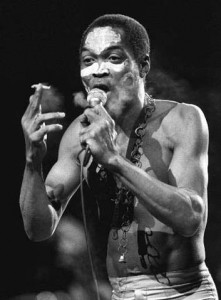 For Fela! fans who want to read beyond the Playbill notes yet aren’t up to the harrowing biography Fela: This Bitch of a Life by Carlos Moore can avail themselves of a no-nonsense six-page (with big photos) feature on the Afrobeat icon. There’s even an accompanying piece of Fela’s sons Femi and Seun and how they’ve dealt with their dad’s legacy.
For Fela! fans who want to read beyond the Playbill notes yet aren’t up to the harrowing biography Fela: This Bitch of a Life by Carlos Moore can avail themselves of a no-nonsense six-page (with big photos) feature on the Afrobeat icon. There’s even an accompanying piece of Fela’s sons Femi and Seun and how they’ve dealt with their dad’s legacy.


